GUEST BLOG: Ian Powell – Health system now “beyond a crisis”
Perhaps Minister of Health Andrew Little is right to deny the existence of a crisis in Aotearoa New Zealand’s health system. However, to the extent that he is right, it is accidental. It is not because there was never a crisis or it has been mitigated enough to no longer warrant this descriptor.
Instead, it is because the health system now finds itself in an even more precarious position, beyond a crisis. Before going further it is useful to appreciate what the word ‘crisis’ means in the context of a universal health system like New Zealand’s.
Health system crisis
Crisis is when there is an internal experience within a health system of confusion and anxiety to the degree that formerly successful coping mechanisms fail those working in it and ineffective decisions and behaviors take their place.
The dominant emotions within the system include confusion, vulnerability, anxiousness, fear, anger, hopelessness and helplessness. Words like contingency, emergency, exigency and juncture are common synonyms of crisis.
A crisis is when a health system is at a crucial juncture whose outcome will make a decisive difference for better or worse. A health system crisis is when there is a workforce crisis due to prolonged and extensive severe shortages.
This is because of the centrality of workforce to highly labour intensive, integrated and inter-connected universal health systems, such as in New Zealand.
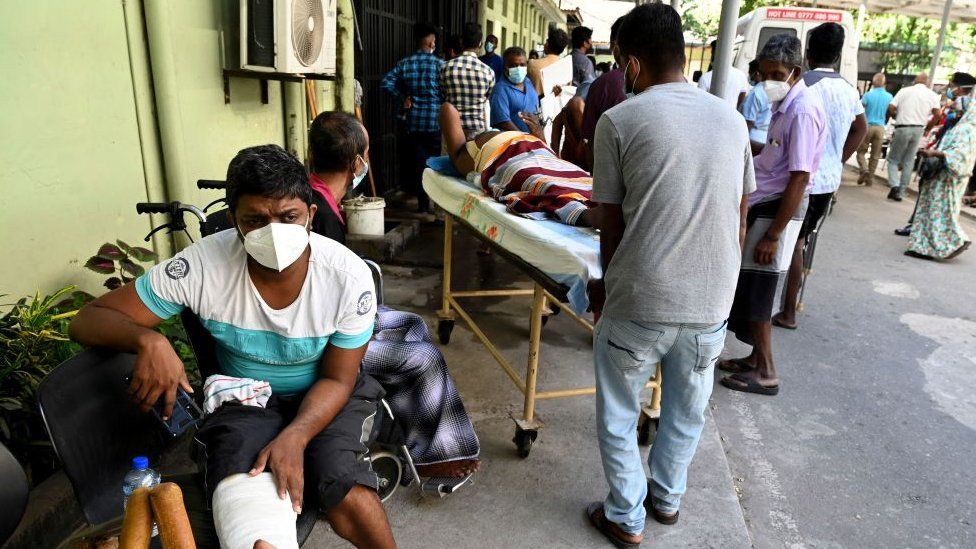
This BBC photograph is about Sri Lanka’s health system verging on collapse; is Aotearoa’s health system unlikely to be in a much better space?
For me a health system crisis is when the juncture at a particular point of time and circumstance is at a tipping point into collapse. It can either tip over into collapse or, through good leadership or sheer good luck, pull back from the precipice.
Beyond a crisis
On 25 June Stuff journalist Benn Bathgate published an article under the heading ‘Dire warning from health frontline’: Beyond a crisis – whistleblower’s dire warning from the hospital frontline.
It is a sorry indicator of the difficult and top-down control of the health system that a staff member who spoke to Bathgate would only do so as a whistleblower for fear of loss of job. But it is the substance of the comments that is important.
The article focussed on the former Waikato District Health Board but the experience outlined is applicable to all public hospitals in Aotearoa. Hospitals are described as “not coping at all.” Further: “Actually we are beyond a crisis, we are broken. The minister, the prime minister are not acknowledging it.” [emphasis added] Hospital care is being provided by “just a lot of exhausted, disillusioned staff.”
Bathgate reports staff as identifying the causes of this ‘beyond crisis’ state of affairs as being inadequate staffing numbers and underfunding from successive governments. This precariousness is made worse by the impact of the Omicron variant of Covid-19 and winter flu exacerbating staff shortages.
Not an isolated experience
This is not an isolated experience. To one degree or another all public hospitals are experiencing something similar.
Today (8 July) Otago Daily Times journalist Mike Houlahan reports a worse than crisis situation in the Otago and Southland hospitals: Hospitals struggling to treat patients. In his words:
Southern hospitals were in desperate straits last night, as staff from all disciplines were reassigned from their usual duties to treat sick patients.
Dunedin Hospital was over capacity and its intensive care and Covid-19 wards were at capacity, while several rural hospitals were battling to find staff to fill medical and nursing rosters.
Staff were yesterday advised all training and education work was to be deferred, and all “available and appropriately qualified” staff were being asked to do clinical duties rather than their usual roles.
…all hospitals in Otago and Southland are struggling to manage with a high number of patients, while also coping with staff absent either through seasonal ailments or due to Covid-19 requirements.
“Staff are really under the pump and it’s all hands on deck…”
“People are working incredibly hard but it’s a nearly insurmountable strain that they are under.”
Meanwhile, on the same day, Stuff journalist Cate Macintosh reports the grim news of surgical waiting lists soaring leaving desperate patients to languish in pain and feel “like the living dead”: Languishing surgical patients in pain feel like the living dead.
Getting to ‘beyond crisis’
The crisis that has been allowed to deteriorate to ‘beyond crisis’ is well illustrated by Jeff Bell’s cartoon published by Stuff (7 August).
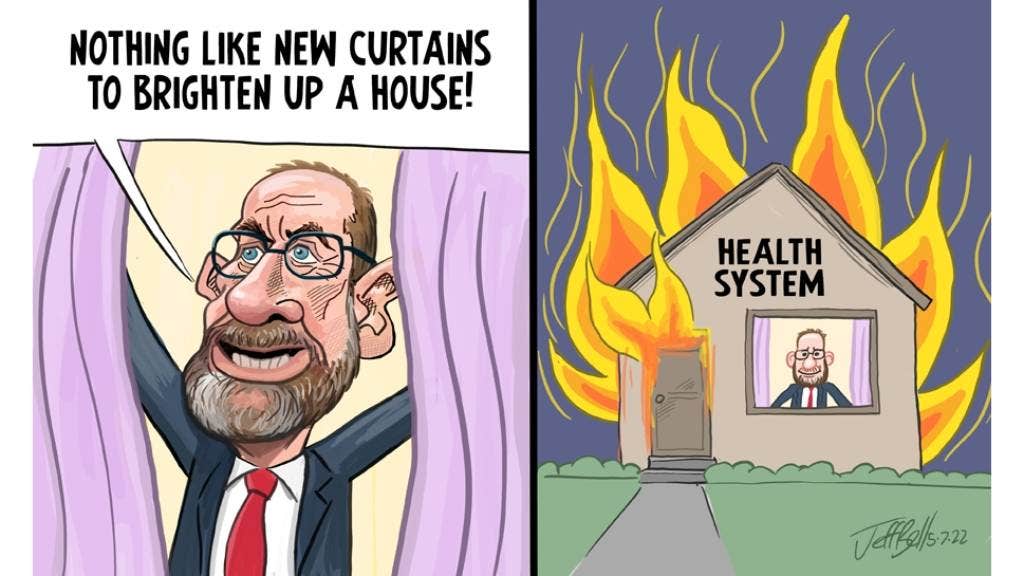
The opposite universes of Health Minister Andrew Little and New Zealand’s health system
The opposite universes of Health Minister Andrew Little and New Zealand’s health system
In late October 2017 the Labour led government, with Jacinda Ardern as prime minister and David Clark as health minister, inherited a workforce (ie, health system) crisis as an unwanted legacy of the previous National led government.
In 2017 severe workforce shortages were the greatest pressure on the health system. But the most generous description of Labour’s response has been neglect thereby allowing the situation to get worse. There was not even the development of strategies to address these shortages.
If there had been a proactive genuine endeavour to address these shortages soon after taking office in 2017, we would not have fixed all of them but we would have been well down the path towards this outcome.
The health system would still have struggled under the pandemic pressures, now reinforced by harsh winter flu. But it would have been much better placed to handle them, including a higher level of patient access to diagnosis and treatment and a much less stressed health workforce.

Prime Minister Ardern’s government focussed on repositioning and centralising bureaucracy
Instead the Ardern government focussed on restructuring the system essentially by repositioning and centralising bureaucratic decision-making. And what has been the unsurprising outcome?
The health system has gone from being in crisis to being beyond crisis – collapsing under the weight of poor political leadership.
This collapsing can be turned around but not until we have a qualitative turnaround in the standard of political leadership. New Zealanders deserve this turnaround now. They should not have to wait and hope until next year’s election.
Ian Powell was Executive Director of the Association of Salaried Medical Specialists, the professional union representing senior doctors and dentists in New Zealand, for over 30 years, until December 2019. He is now a health systems, labour market, and political commentator living in the small river estuary community of Otaihanga (the place by the tide). First published at Otaihanga Second Opinion

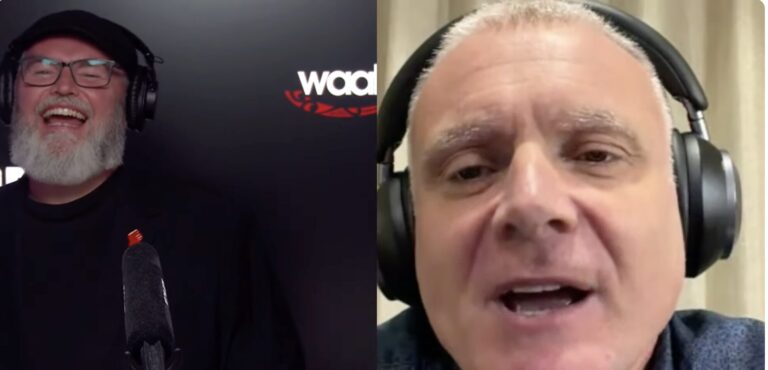

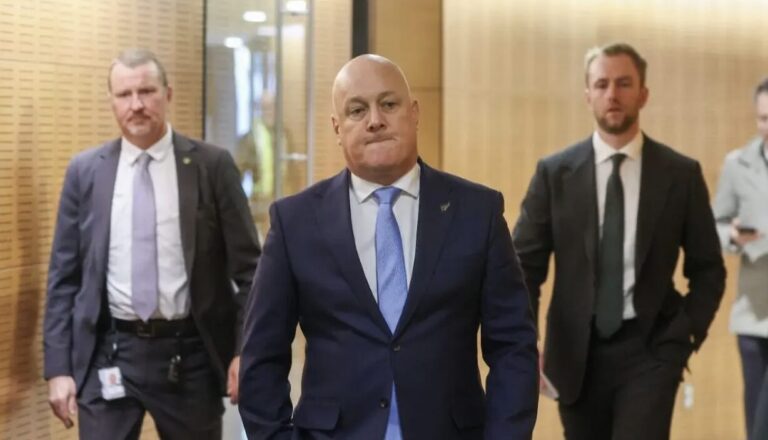


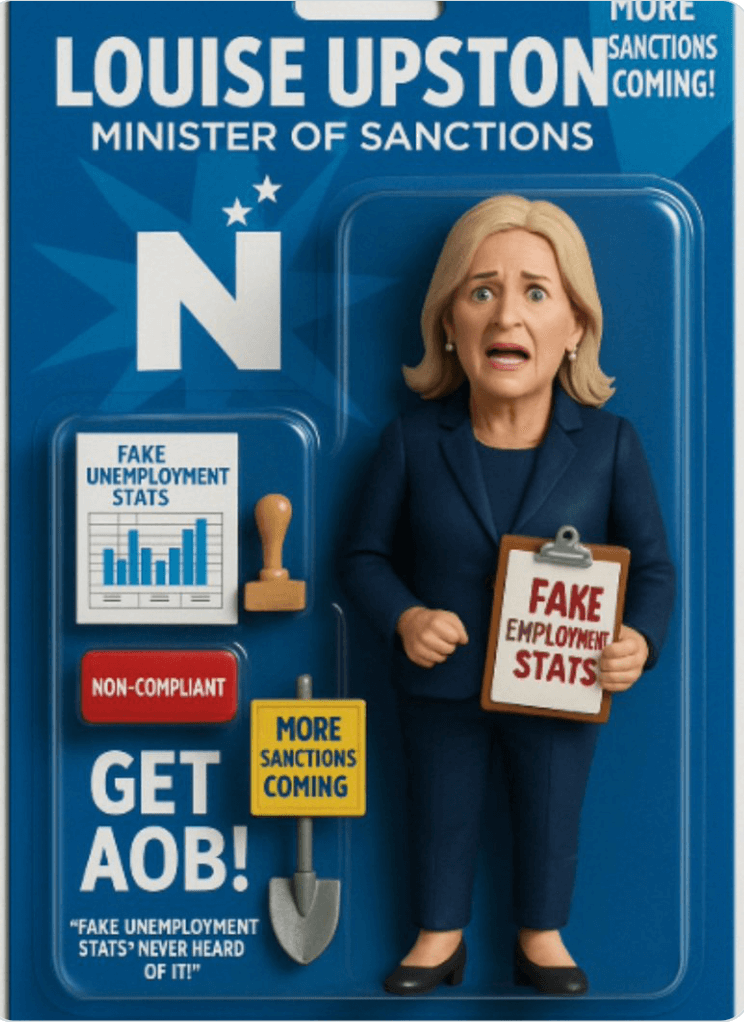
Anywhere that lets SARS2 rampage ends up with a munted health system and workforce.
Chinese are doing Dynamic Zero Covid and winning. In a few years they will send out expedition teams to recover any goodies from the rest of civilisation which has collapsed bc the population suffered the horrors of thrombotic vascularitis after the Billionaire class fooled them into soaking themselves repeatedly in Next Variant covid waves.
yep- “trust me, I’m a doctor,” https://khn.org/news/article/pfizer-ceo-albert-bourla-covid-booster-evidence-lacking/ (actually a vet)
Ian, I’d take you more seriously if you hadn’t spent umpteen years running the world’s most bloody useless union – the ASMS – which saw my pay and conditions become so fucking shit.
Your own outfit’s numbers show the top pay in NZ is 60% of Australia’s starting pay. Do you take any responsibility for this? When did you call for work to rule for example?
ASMS membership numbers tell something different with over 90% of permanently emoloyed senior doctors and dentists employed by DHBs members. To the best of my knowledge no other union managed this density. You were working before my time. At that time annual leave was 4 weeks; no as of right CME expenses; 10 days sick leave per annum; no availability allowance as a retainer for being on call; no obligation to pay for agreed average hours worked; and no penal rates for working after-hours on call. These are examples only.
When I left annual leave was 6 weeks (better than Australia); CME expenses $16k per annum; open-ended sick leave; a retainer for being on call; requirement to pay for agreed average hours of work; and T1.5 (or higher) for hours worked on after hours call.
The massive pay gap with Australia was accelerated by the tragic avoidable patient deaths in Bundaberg due to the employment of a deficient surgeon recruited from the US. This led to the Queensland government around 2008 agreed collectively to huge remuneration increases which then to various degrees spread to the other states due to inter-state competition.
I was the one who first researched specialists salary parity with Australia in 2009. This revealed a very large pay gap. It wasn’t possible to progress this under the austerity funding of the then National led government in the 2010s. In 2019 I commissioned BERL to undertake independent research on salary parity with Australia. This confirmed my original research except that the pay gap had got even higher.
I am so relieved that as an anaesthetist your preparation for the operations and pre and post-operative care you were involved in was no way near the lack of preparation demonstrated in your above outburst.
Just saying.
If Ms Ardern had not said: ‘Personally I have never wanted to see people criminalised for cannabis use’, and this is a quote from the Labour Party advertorial I had on my fence for some time before the last election, I am thinking the election outcome would have been a lot different.
The right to self medicate, be it comfrey, cow-parsley or cannabis, to eat what we see fit for our own personal eco-systems and thus the right to bodily autonomy, seems to have been usurped by Mr Pfizer and Ms Liquorice u8sing the tohunga suppression act v.2. whilst voices of reason and inclusion are drowned out by the fatuous utterances of arms dealers and career actors in plastic suits. Strange times indeed.
The health systems in Oz, Canada and the USA are all facing the same health sector staff shortages as here.
You are right but from what I see Oz and Canada are doing something about the problem not like Dr Do Little and sticking their head in the sand and saying no crisis here
Let’s put things into perspective Trevor, there was no housing crisis either. One thing however is different, Labour acknowledge Health is buggered and have implemented a strategy to change how Health can be improved. This did not happen with Nationals housing crisis, it got worse.
You are on the front line so I will take your input as correct but as someone with skin in the game so to speak does not look as though much is improving .but they have 18 months to prove me wrong.
I agree housing and health could have been handled better by the last National government .With imput from Shane Reti it should be better next time around. Housing is still not good under Labours watch
I like Reti, Trevor. He is articulate and intelligent and would be a great Health minister if given free reign to implement his ideas.
What I struggle to understand is that Little and the government are trying to make change for the better and we won’t know this for some time. 18 months sounds fair however it’s only been one week so I think either expectations are way over the top or trolls will also be trolls on this site.
The first big tick is the culling of the middle management in some areas. Needless waste, whom have been entrenched in positions and whom created a bully mentality. Money’s not the only reason why staff are leaving in big numbers. In fact several I know have left the profession altogether because of bullying.
But housing is still better than under Nationals watch, that cannot be in dispute. Labour building state homes, National sold them.
Geez neither of you get it.
Blatant under funding of the health system and denial of any problems within it by both national and labour.
Blatant shortage of staffing training.
Shortages of staff on the wards due to staff of sick.
Staff not getting annual leave due to staff leaving and or not being allowed time off due to the staff shortages.
Staff suffering burn out.
Along with a damn sight more reasons like Flu and the RSV virus on top of a now 2nd wave of omnicron.
Stand by for omnicron 2.75 which can reinfect after only 3 weeks and every time you get reinfected increases your risks of long covid by 50%.
All the above is why our health system is where it is along with the blatant under funding of Pharmac .
Yes Geoff, you are right. Staffing at the front line is what needed to be addressed. Shifting management to Wellington and calling the “new” organisation weird names is not going to make anything better, just more confused!
Yep remember this doozy…
https://www.nzherald.co.nz/nz/jonathan-coleman-accused-of-covering-up-bungled-financial-forecast/3HLO4U452DJZHXZC224LUBNBDY/
And Coleman through the health director under the bus, gutless prick!
Yes it is in collapse. 3 weeks to get to see a GP after a blood test that has “issues”
Mr Andrew Littles new structure has allready failed as it starts with out a full front line team to actually provide adequate health care at the fromt line, GP’s, nurses, mental health teams. He does nothing to address this fumdamental problem
Instead he changes the admin structure, calls it weird names and thinks all will come right in time.
A front line person told me that it felt like they were workimg at the point of an inverted pyramind carrying some 23 administrators to whom they must account, while still actually dealing with the public on the front line.
Put simply it’s a disaster that will hammer more nails into the coffin of this Government but unfortumately also into the coffin of many a citizen.
The claim that the disaster that is unfolding in our ED departments is the result of unprecedented numbers of patients is bogus. Here are the stats for how many people presented to an emergency department each year during May:
2017: 98,192
2018: 99,767
2022: 92,242 (for 4 weeks not the full month)
Enquiring minds would also like to know the additional impact, and the true numbers, of people hospitalised and otherwise suffering with adverse vaccine reactions. There are some very seriously concerning figures coming out from other jurisdictions but what appears to be a wall of silence here.
20,000 tin foil hat wearers were admitted with brain damage.